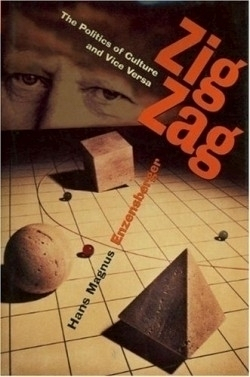
Zig Zag
The Politics of Culture and Vice Versa
Brecht called it writing “for the drawer”—works deemed too inflammatory for his East German censors. But now, when everything in our media hungry age is permitted to be seen and read, mere self-censorship has to do. Which is why Zig Zag, Magnus Enzensberger’s decade plus piecework of essays and journalistic squibs, is so maddeningly uneven. A poet and eminence grise of German letters has, one suspects, very deep drawers.
Like his well known compatriots Christa Wolf and Gunter Grass, Magnus Enzensberger’s formative years were overshadowed by WWII, and he was (and is) both grateful and wary of America’s ever growing cultural Marshall Plan. Indeed, as something of a German gadfly needling the flanks of the transatlantic political animal, he can be mordantly reflective. When he
parses the military origins of “avant-garde”—that shiny medal the artistic shock troops pin on their breasts before bludgeoning the commercial rank and file—he has described not only the Nazis? degenerate art but also our own NEA wars. Art too takes hostages, terrorizes and words matter, desperately. But his self portrait as a Fulbright exchange student on a Greyhound bus circa 1950, finding Hopper-esque Americans gregarious but curiously impersonal, trails away so lamely his lecture audience at New York University in 1997 might be forgiven for longing for a hook to get him off-stage. Even had he divined what the poet Amy Clampitt termed “Disneyitis,” a cartoon brightness that insists everything IS only surface, he would have only begged the question he refuses to consider: why has this version of reality seduced so many? Ironically, it is only in a chanced remark near the end of the book that suddenly shows how high the stakes are, and what a more focused essay might have sounded like: his daughter is one for whom books have “lost their power over her life.” And abruptly he is all too human, trying to speak to the Germany for the next millennium.
Reviewed by
Leeta Taylor
Disclosure: This article is not an endorsement, but a review. The publisher of this book provided free copies of the book to have their book reviewed by a professional reviewer. No fee was paid by the publisher for this review. Foreword Reviews only recommends books that we love. Foreword Magazine, Inc. is disclosing this in accordance with the Federal Trade Commission’s 16 CFR, Part 255.
